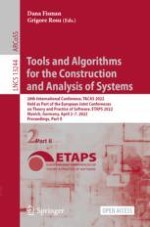This open access book constitutes the proceedings of the 28th International Conference on Tools and Algorithms for the Construction and Analysis of Systems, TACAS 2022, which was held during April 2-7, 2022, in Munich, Germany, as part of the European Joint Conferences on Theory and Practice of Software, ETAPS 2022.
The 46 full papers and 4 short papers presented in this volume were carefully reviewed and selected from 159 submissions. The proceedings also contain 16 tool papers of the affiliated competition SV-Comp and 1 paper consisting of the competition report.
TACAS is a forum for researchers, developers, and users interested in rigorously based tools and algorithms for the construction and analysis of systems. The conference aims to bridge the gaps between different communities with this common interest and to support them in their quest to improve the utility, reliability, exibility, and efficiency of tools and algorithms for building computer-controlled systems.
